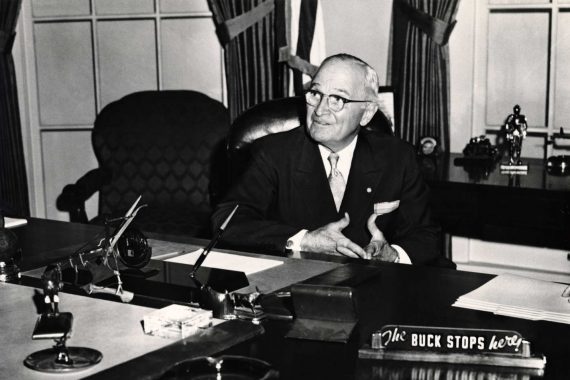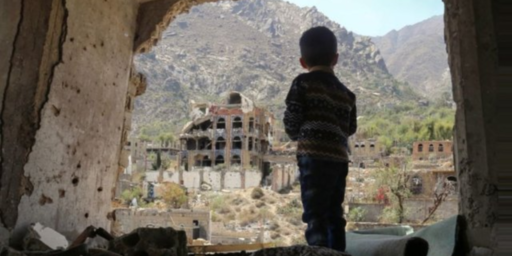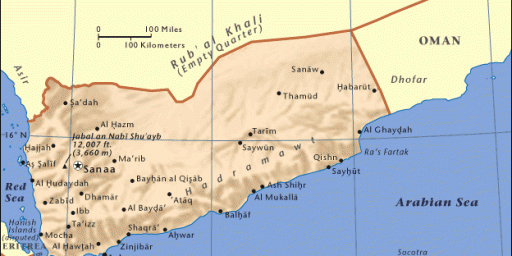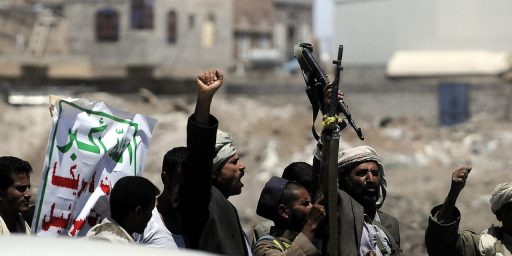The Buck Stops Elsewhere?
A new Pentagon proposal would place more discretion in the hands of field commanders, removing the need for Presidential approval.
The Pentagon is reportedly considering a change in policy that would allow Generals and field commanders to undertake some raids connected to the War On Terror to be undertaken without direct authorization by the President of the United States:
Military commanders are discussing speeding up the authorization of counterterrorism missions by allowing the Pentagon or even field commanders to approve some of them rather than the White House, US defense officials told CNN.
As CNN first reported Tuesday, the military is seeking to increase US intelligence-gathering raids in Yemen similar to one undertaken in the first week of the Trump presidency. It’s not yet clear if this adjustment in the approval process could be used for those operations.
“It is a philosophy more than a change in policy,” White House Press Secretary Sean Spicer said Wednesday of the discussions about the authorization process. President Donald Trump “believes these are the experts in this field.”
At the same time, Spicer said that “the protocol is not changing in terms of what has to be signed off,” and that “there are certain decisions that have to be signed off by the President,” so that the degree of change might not end up being that sizeable.
A senior defense official emphasized that this does not mean that the President would not be briefed. Defense Secretary James Mattis and senior military commanders could brief the President at any time and seek his specific approval.
Since these are fundamentally judgement questions, the senior defense official said, the goal is to see if there could be a more efficient approval process for time-sensitive missions.
Military analysts warned, though, that pushing decision-making authority below the President for high-risk missions could create problems.
“The risk in greenlighting missions at a lower level than the President is one where the President assumes all the responsibility if something goes wrong, and he would really find it difficult to do that if in fact he was not part of the approval process,” retired Col. Cedric Leighton said. “That element of decentralized control — which the military loves in many cases, and in theory that the President loves — but the problem that you have with that is, if something goes terribly wrong, you are going to end up with a lot of political fallout for something you didn’t really approve or understand the minute details of.”
He continued, “From a political standpoint it may be good for somebody who wants to wash their hands of it or something, but from a military standpoint it really abrogates the authority that the commander in chief has inherent in his position.”
Leighton said that authority can be particularly essential for difficult operations: “What you really need is a commander in chief who is involved in the approval process, especially for politically sensitive missions like Yemen.
On some level, this change in policy makes some sense. History has shown us the dangers of a President who micromanages a war to the point of approving and monitoring every military mission on a personal basis. President Johnson, and to some extent President Nixon, became so obsessed with the success or failure of every bombing run and battle during the Vietnam War, for example, that he allowed it to overwhelm his Presidency and ultimately lead him to decide not to run for re-election in 1968. During the Civil War, Abraham Lincoln monitored the status of battles so closely that it often seemed like he was his own Commanding General, although given the nature of the military leaders he was forced to choose from prior to his selection of Generals Grant and Sherman to lead the war effort in the war’s final years that may have been a wise decision. On the other hand, history has also shown us the dangers of Presidents who become disengaged, either by choice or inadvertently by application of policy, from important military and diplomatic decisions only to pay the price when those decisions blow up in their face. Examples in this area include things such as the Iran/Contra scandal during the Reagan Administration and the decisions regarding security at diplomatic compounds in Libya that were apparently made at lower levels in the State Department without significant consultation with either the President or the Secretary of State. Ideally, then, there ought to be some middle ground between the President as the micromanager of a war and a President who is either deliberately or accidentally shielded from decision making that later results in what later turn out to be serious consequences such as civilian casualties or serious political blowback.
The most important principle that ought to be kept in mind in evaluating an idea like this, though, is the fact that the President is the Commander in Chief of the armed forces and the United States has a tradition of civilian control and oversight of the military that goes back to the nation’s founding. Anything that detracts from that principle ought to be viewed with suspicion. It’s arguably not necessary for the President to pre-authorize every air strike or cruise missile launch, or for the military to forgo a target of opportunity because they have to wait until approval goes up the chain of command. At the same time, it strikes me that Constitutional principles and general common sense require that the President be fully briefed on what’s going on, and that major military operations, such as the recent raid in Yemen that resulted in the death of a Navy SEAL, be authorized by the President before being executed. The alternative would be to turn far more regarding war-planning over to the military than seems healthy or proper. In any case, we’ll have to wait to see the details of these new procedures to see exactly what the Pentagon has in mind, but any change in procedure that puts undue discretion in the hands of field commanders that could result in actions that have significant international blowback should be avoided.







This would really depend on (a) how many get this leeway and (b) what happens to them when they inevitably screw it up. Military hierarchy exists for a reason – too many chefs ruins the soup. If there was coordination and cooperation, it would be a sound idea but the chances of one op messing up another or being at cross-purposes would be much higher with this change.
We also need to keep in mind the diplomatic repercussions that military actions take. We live the real world where unfortunately the smart military move is a horrible diplomatic blunder with 3rd party countries. How much do the Generals know (or care) about that sort of thing when the time comes for planning? The President is supposed to make his decisions based on all his advice, not just the military’s.
@KM:
Normally, I would be very much opposed to devolving decision authority from the White House to DoD. At the moment, though, anything that moves a decision farther away from CASE NIGHTMARE ORANGE and his closest advisors has to be considered a good thing.
Somehow I don’t think the Florida trick is going to work again in the time and age.
So I can’t wait for the day Trump’s aides have to tell him that the local commander droned the Saudi king based on “credible information” of support of terrorism. While on the Trump golf course in Dubai.
The idea that we would let the military freelance is one of the most scary things I’ve heard out of this administration.
Bottom line is that the orange blob is not going to be held accountable anyway…so WTF? Right?
Is tiny hands too busy counting the proceeds of his corruption to actually perform the duties of the so-called president?
1) The president is a moron so the military doesn’t trust him to decide how he wants his eggs let alone to make military decisions.
2) And Trump’s so f–king stupid he doesn’t realize the POTUS gets the blame regardless.
@michael reynolds:
Aw, come on. Trump has said that he knows more about ISIS than do “the generals,” as he calls them. And how does he know so much? He watches “the shows.”
This doesn’t seem like a great idea — remember, Flynn was a general, and I don’t think we want someone like him making policy on his own as a consequence of a military action.
What are the metrics that they will be measuring this policy against, and what determines whether it is a success or failure? Is this like Art, where we will know it when we see it, or are there more concrete metrics?
How often did Ike check with FDR during WWII? I find it impossible to believe there was anything like the day-by-day or even minute by minute interaction that seems expected today. And it’s even more impossible to believe such perpetual consultation would have improved anything if it could have been done.
Mike
@MBunge:
Oh good grief. They obviously communicated as quickly as they could, given the limitations of the time.
You are just spit-balling you opposition and have no real critique to offer.
This seems like a bad idea. As Gus said, Flynn, as well as others, have been less than optimal for conducting foreign policy.
@MBunge: Are we involved in anything on the level of WWII?
If we were making dozens of attacks across three different fronts, daily, then I think we could leave the President out of the details. But, we arent. We are doing tiny operations scattered here and there, with the occasional raid on a camp.
I don’t think the president needs to be watching the action as it happens, but i do want him to sign off on offensives, incursions into different countries, and anything that could change the political landscape, like putting boots on the ground in Yemen. Presidenting is hard. It’s like adulting, except you’re responsible for more lives.
If Trump cannot be bothered, then he should resign.
@michilines:
I’m no military historian and I’m pretty sure you are not either, so maybe someone who is can clear things up. If you are suggesting that the Allied prosecution of WWII would have gone better if more decisions had been made by a polio-stricken patrician and fewer by a professional soldier, allow me to suggest you don’t have the slightest freaking idea what you are writing about.
Now, I am old enough to remember that one of the advantages we were supposed to have over the Commies is that our military had greater freedom of action while theirs was the one that had to wait for the Politburo to make every decision for them.
And here’s a critique for you. Barack Obama, by all accounts, engaged in the up close and personal military decision-making you appear to be endorsing. After eight years of that, we are not only no closer to achieving victory…WE STILL HAVE NO REAL CONCEPT OF WHAT VICTORY EVEN MEANS. We quite undeniably need our political leaders to concentrate a bit more on the big picture and not be so wrapped up in aimless tactical management.
Mike
@MBunge: Actually, Mike, if you want to read – for example,
Churchill’s 5 volume record of his WW2 story – they were very busy with second guessing their generals.
Read and learn before you reach for that keyboard. You’re pretty disappointing at this point.
@Gustopher:
And my response is that as we are rapidly closing in on 20 freakin’ years of “tiny operations scattered here and there” without even the vaguest indication that an end might possibly be in sight, it is probably time to consider that our Presidents should spend less time playing “Risk” in real life and more time coming up with a different game.
Mike
@MBunge: OK, honey. You explain to the Pres who supervised, led, commanded (whatever locution suits you) the killing of Bin Laden WHAT VICTORY MEANS.
Then post it here and we’ll all be better informed.
Until then — I’ve had a little whiskey — FUCK OFF.
@JohnMcC:
And you might want to pay attention to what we’re actually discussing. Politicians have been second guessing generals forever, sometimes for the good and sometimes not. We’re actually discussing something else, namely the wisdom of a political leader, usually with little or no military background, literally functioning as a supreme commanding general.
How often do police commissioners get involved in the daily activities of detectives? How often are hospital administrators consulted on diagnosis and treatment? Heck, look at the world of professional sports. Franchises where the owner or the general manager are constantly involving themselves in coaching decisions, and vice versa, are almost always basket cases that never win a thing. And those are outfits dealing with a fraction of the variables facing even the simplist military operation.
Mike
@MBunge:
A) Lincoln repeatedly interfered with the military, and thank God he did or we’d have lost the Civil War. At the start of that war the only generals who had a clue were Winfield Scott who was older than Methuselah, Grant who had been cashiered for drunkenness and Sherman who’d been locked up in an asylum. The professionals were largely idiots.
B) In WW2 the decision to put Ike at the head was a political one, made by FDR, Churchill and Marshall. No, FDR did not okay each mission because FDR was thousands of miles away and could only communicate quickly by very insecure radio. A pity, since maybe FDR would have been able to stop General Mark Clark from wasting thousands of lives in his vainglorious attempt to reach Rome. Or he might have moved forces off Anzio rather than letting them be bottled up by incompetent generals. Or he might have avoided the pointless horror of the Hurtgen Forest. Those are three examples, I’ve got plenty more.
The notion that generals always know best is b.s. No one knows best. It isn’t dentistry, best left to dentists, it is the violent nexus of politics, logistics, war strategy and post-war strategy. It’s about the most complex thing humans do and no serious military thinker would be so shallow as to imagine that the political sphere can simply be excluded.
What if a general gets it into his head to bomb Saudi Arabia because ISIS fighters are present? What if one decides to pick a fight with Russian planes over Damascus? What if an admiral decides he’s tired of the Chinese navy in the disputed islands? Would you rather the Cuban missile crisis had been handled by the generals and admirals who were ready for WW3?
This is precisely why it is so vital that voters not do something stupid like, say, electing a malicious cretin to the White House.
We can debate for hours about whether the generals should be left alone to run a war (ridiculous and terrible idea, by the way). But that’s not even at play here. We are not at war with Yemen. Or Pakistan. Or Libya. Or anyone of a dozen places that we conduct raids and kill people. The coward Trump may have just realized that these decisions are too hard for him, but they are his regardless. it doesn’t matter if he puts his fingers in his ears and lets the generals do what they want – the decision to conduct military operations in a country we are not at war with is a US decision, and he is the president. We have understandings with the governments of those countries and their allies, either negotiated or imposed. The military doesn’t get to pick a random country and decide to attack.
A lot of ignorance in this thread about how military operations take place. Its not anyones fault–it’s just that so few Americans serve(d) in the military that the unfamilarity breeds suspicion.
Kinetic and Direct Action activities are only the tip of the spear of an operation. There are alot of support actions that go into making sure the shooting and explosions part are done right with the minimum amount of collateral damage and casualites for our guys.
Routine prepatory missions now have to be approved by the President. This means that terrorist cells have far more agility in executing operations than we have in thwarting them. You think terror cell leaders have to call their HQ for approval to start planning and execute an attack? Military support missions are the type of non-sensical activies that are going to the POTUS for approval. The best case is for the military professionals to do all the prep work and for the civilian leadership to approve the last steps of the operation that are going to make the news.
This doesn’t mean that the President doesn’t know what’s going on…he is informed of the 5Ws and can give guidance/feedback on his expectations. If the miltary professionals can’t work within his guidance and meet his intent—they should be be fired and replaced with those that understand how to achieve the President’s goals without needing to be micromanaged. There are multiple levels of leadership between the guy that pulls triggers and the President–we need to trust those people to do their jobs. The President needs to be free to work on multilple levels of policy and strategy—foreign/domestic/economic/ etc. Getting bogged down into any one phase of his responsibilities–including the military means his other responsibilities get shirked.
Leaders with this level of responsibility delegate authority to lower levels and hold those middle leaders responsible while they themselves still hold accountabilty for the decisions of those leaders.
There was a comment above about Obama “supervising” the BinLaden mission. Cudos to Obama for approving the mission and wanting to monitor its progress—but if anyone thinks Obama or any politician for that matter with zero experience in tactical counter-terrorism is “supervising” trained professional with years of experience hunting terrorists. I’ve got a Trump tower to sell–very cheap for OTB commenters.
Trump effectively said, “Nope, not my fault, I had nothing to do with any of that negative soldier gets killed stuff. Now, any of the good stuff, I’ll take credit for … okay?”
@al-Alameda:
If only he could muster some good stuff. His well-oiled machine is a lemon.
@MBunge: It’s difficult to achieve goals in various sorts of police and quasi police actions where no specific aims beyond “we are going to eliminate terrorism wherever we find it” are ever announced. But carry on with your rant.
@Just ‘nutha ig’rant cracker: I agree. The whole War on Terror is nebulous. Where do we fight? Who do we fight? How do we know when victory has been achieved? Right now the only coherent plan seems to be to do what the Saudis want; i.e. oppose the Syrian government and the Shia in Yemen. How all this “fights terrorism” is not clear.
War is the continuation of politics by other means. I don’t hold the president responsible for operational details. I am sure FDR did not plan out the number of rolls of toilet paper carried by Operation Overlord, but he certainly was responsible for the political decision of when and where to open a second front. No President will be fine tuning operations in the Levant but is absolutely responsible for the political decisions to use arms, how armed force will be applied (drones or boots on the ground, and how to administer conquered lands.
@michael reynolds:
Aye, but it is to be hoped his is smart enough to know he currently has no business being in that loop. He is non well informed…to put it mildly…on tactical matters nor on the subtleties of The Great Game of nation states. The Deep State guys need to handle this until and if he ever gets up to speed.
FWIW, it wasn’t as if Obama was huddling with field commanders, their recommendations would be channeled first through his massive NSC, which was filled with a lot of academics who asked a lot of silly questions which not uncommonly drove the commanders half nuts. This is essentially a restoration of the more traditional way to run wars. I personally judge Mattis up to the task and I am glad to hear of Trump’s backing away.
At the start of that war the only generals who had a clue were Winfield Scott who was older than Methuselah, Grant who had been cashiered for drunkenness and Sherman who’d been locked up in an asylum. The professionals were largely idiots.
I respectfully disagree with this statement. This may have been a generalization or a throw away line but , for example, General Winfield Scott Hancock, sometimes called the “Superb”, was a tremendously effective general. See Winfield Scott Hancock, A Soldier’s life by David M. Jordan and from the best one volume history of the Civil war, Battle Cry of Freedom by James McPherson. At Gettysburg, Hancock arrived and set up the “defensive line curling around Culps and Cemetary hills and extending two miles south along Cemetery ridge…(page 655 of Battle Cry of Freedom), rushed the first Minnesota into a gap to slow the rebel advance (page 660) and, although wounded in repulsing Picket’s charge, urged Meade to attack the damaged Southern army (page 663). Meade failed to counterattack and allowed Lee and his army to escape, for which he has been criticized. Two other very competent generals that quickly come to mind are Sheridan and Chamberlain.
On the more general issue, we know the President Trump will diligently learn from intelligence briefings so he will have the knowledge and background to intelligently make these decisions. Or not…
And finally, President Carter approved a very unsuccessful raid to free the Americans who were held at the embassy in Iran. He had military experience but almost certainly did not plan or execute the raid. It makes me wonder about the the credit or blame that a President is accorded for these types of actions.
President Trump recently seemed to place blame for the recent seal’s death in Yemen at the feet of the generals and military staff, not himself. President Truman (the buck stops here) and numerous others took responsibility for raids, military actions, etc.
In terms of the above policy change, given the present president, it may be better to have the military personnel make the decision. This also suggests the very low functioning level of our present prez.
@Midwestern Dad:
Meade got hammered for that but it must be said his forces were not exactly well organized for that move. It must be considered that Meade’s plan had been to fall back to a line to defend DC, and it was his field generals who forced his hand by engaging where they did, at Gettysberg. From there it was a mad scramble. Meade had only vague notions of where most of his forces were, exactly.
This had been unexpected. It was not how that Army had behaved up to that point. They had always fallen back on a moments notice. What the hell happened??
I get the sense that those men were not down with the idea of Lee’s army running roughshod all over PA. They were no longer looking for the politicians to settle this…someday…and they fought.
Gettysburg marks a sea-change in the attitude of that army. I suspect it was at that point the collective realization there was but two ways home…death and final victory over the Confederacy…took root. That notion took a couple years to sink in to the staff. The officers stopped inflating reports of enemy strength at about that point. They got serious. McClellan may have been an excellent general…had he come along at that time…as opposed to being the guy who tried to lead that bunch at the outset.
We will never know.